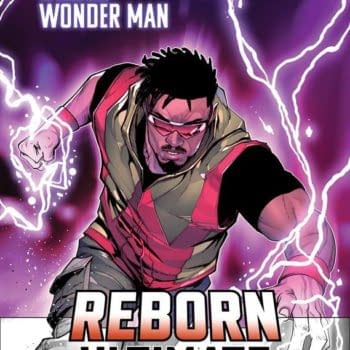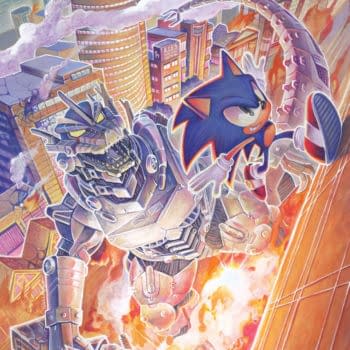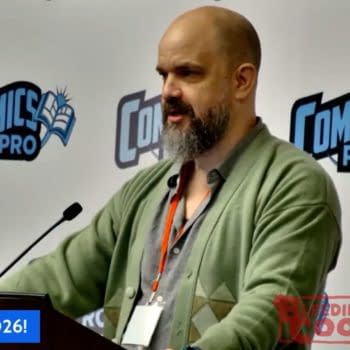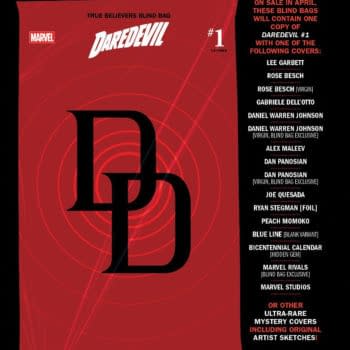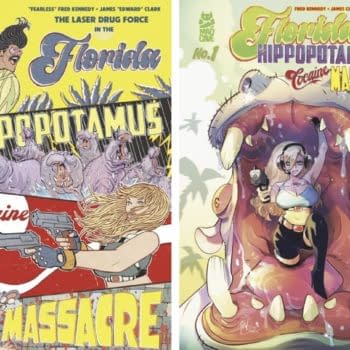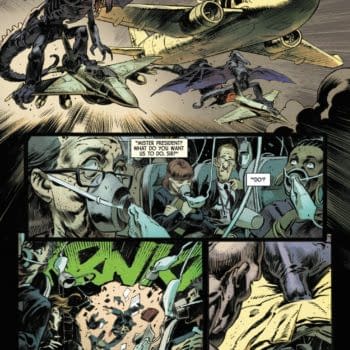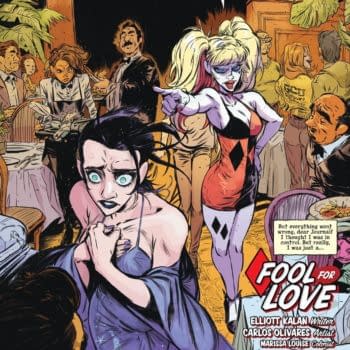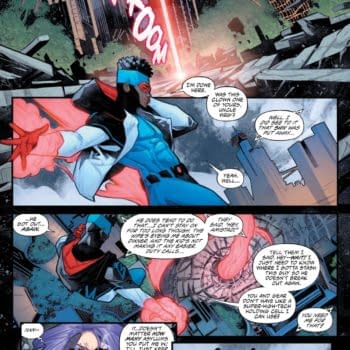Posted in: Comics | Tagged: Comics, entertainment, marvel, spider-man, steve ditko
Fifty Years Since Steve Ditko Quit Spider-Man
Part I of IV: Kickstarting
Next year marks the 50th anniversary of Steve Ditko's departure from Spider-Man, a character he co-created with Stan Lee in Amazing Fantasy #15 (Marvel) and continued to develop as writer and artist throughout a 38-issue run on The Amazing Spider-Man.
Now in his 80's, Ditko is still producing comics with his publishing partner Robin Snyder, a longtime editor who is also collecting an oral history of the medium via her publication The Comics.
As fortune would have it, I was reading the comics news and satire site The Outhouse a few months back, and discovered an article promoting Snyder and Ditko's latest Kickstarter campaign. I was glad to pledge. It's one thing to pay lip service – You're great! Big influence! Green Goblin! Blah blah blah! – but it's another to actively show one's support.
For instance: Yes, that new Chameleon action figure from Hasbro sure looks keen, but the only reason I like that character is because of Ditko – the way the eye slits in the mask pointed slightly down so as to give a static mask a sinister edge; the crook of his hand holding those fantastic goggles – I can see the panel now. However, I have the choice as a consumer to purchase that toy tribute… for which the man who inspired it will receive no benefit, or to spend that money on a project that I know will directly benefit its creator.
The bundle I purchased included a copy of Mr. A #4 (Snyder and Ditko), issues ofThe Comics, and The Four-Page Series No. 9, which included an essay by Ditko entitled, "Why I Quit [Spider-Man], Marvel."
Wait… What?
The moment of Ditko's departure has been a topic of such fervent speculation for years from industry rags and fanzines to the inevitable newspaper article whenever a new Spider-Man film comes out, unfairly comparing Ditko to a reclusive J.D. Salinger. Yet, in the face of that fervor, here now was the answer, spelled out in black and white under a Steve Ditko byline.
I had to laugh at the absurdity of the situation. This was it! The Holy Grail! Mystery solved! Everyone can sleep sound again! So where were the headlines? Where were all the speculators and fantasists to report the facts on this issue that so consumed them?
The ouroboros quality of comics industry journalism is often hotly discussed on sites like The Outhouse by both contributors and readers. As I read the essay, I couldn't help but think, Where were all the journalists who jockeyed for this scoop, when here it was – the truth – in plain view? It felt like being on the other side of the mirror because the angst over the situation all seemed so ridiculous.
So… why did Ditko leave? Well, it isn't my story to tell, and the last thing the situation needs is to be filtered through another lens. If you would like to know, in the man's own words, you may contact the publisher to order a copy, either using the website – which also includes details on upcoming Snyder and Ditko Kickstarter campaigns – or from the address listed on the masthead, below:

Part II of IV: Arrivals at a Departure
Why, 50-years on, are people still so fascinated by this event, an artist leaving a comic book?
For a certain generation: Fame.
I noticed a perception shift in the 1990's. There was a time, you'd ask a child what they wanted to be when they grew up, and they would respond with a profession. I heard the question asked in the 90's, and the child responded that when he grew up, he wanted to be, "Famous."
Famous isn't a job. It isn't even a character trait. Still, this was the aspiration.
There was also a time musicians like Jim Morrison bristled at the thought of their deeply personal music appearing in advertisements. Fast forward toward the millennium, and Entertainment Weekly asking what "selling out" even means anymore, with bands wanting their music in commercials and it all being good for everyone's exposure and bottom line.
Activities once frowned upon, from sex tapes, Jackass-style stunts, and even being an unwed teenage mother, are now viewed as viable avenues to start a career as… being famous. Even criminality is now viewed as just another path toward celebrity.
Ironically, Mr. A #4, originally published in 1975, touched on this issue, with its story of a thief who becomes a media and high society darling, not unlike the bright, young Hollywood "Bling Ring" thieves, with their reality show, biopic and Vanity Fair party – from which, according to Buzzfeed, a future victim was culled.
There is an interesting passage in Colin Wilson's Great Book of True Crime, which examined the hierarchy of needs, starting with the basic, external ones, such as food and shelter, and then graduating to internal ones. Internally motivated crimes were more common in the idle classes, as their most basic needs were met, and they could focus on other concerns, not a hardscrabble existence.
In that regard, the "need" for fame is a fairly modern criminal motive, but a real one, as evidenced by the case of lapsed criminology student turned serial killer Stephen Griffiths. I don't like giving Grittiths press, as that was his motivation, but the facts of the case were clear. He wanted the fame of a Ted Bundy and Yorkshire Ripper, going so far as to create his own moniker, corresponding gimmick, and, in the opinion of the detective who interviewed him, appeared to have rehearsed for his eventual interrogation.
In a world where fame is so coveted that a deranged few are willing to kill for it, it is simply unfathomable to some people that an artist who co-created one of the towering myths of the age could just stop and walk away.
The enormity of the Spider-Man character, and the public's emotional investment in him, seems to have frozen Ditko's decision in time for many people. I have read articles that say Ditko rejects fame, yet when has Ditko ever said he rejects fame? To this day, whether from Charlton, to DC, back to Marvel, to Snyder, he's never stopped producing.
"Brand recognition" is crucial to any business, whether it is a Ditko byline, a Motown label, a Monet signature, or a John Deere logo. "Fame" is an emotional projection of the admirer to the admired; it is a byproduct of an artist's output.
Perhaps it is more apropos to say the man rejects your idea of fame. You may think a famous person should take selfies, or become a talking head, or appear on Celebrity Cupcake Baking Championship. That's fine for you.
The irony of this self-obsessed, look-at-me culture is that people who claim to "celebrate the individual" do not know how to process an individual who refuses to conform to what they wish him to be.
A few months ago, a young fan wrote to Ditko, who took the time to write back (to the earlier point, how is that rejecting fame?). His handwritten letter was posted online, presumably by the fan's parents. Why? To what end?
Why is an act of courtesy, if not kindness, repaid with exploitation? Are people today so desperate to grab someone else's stardust?
Is that the intent, even behind this article? Was that the intent behind Jonathan Ross' searching for Ditko BBC documentary? Judging by Ross' beaming expression of childlike wonder after having met his hero, I highly doubt it.
But, if I'm being honest, even if riding someone's coattails was not the intent of this article, isn't it still the same effect?
—
Another reason for the fascination with Ditko's departure can be best summed up by the observation Maurice Sendak made while being interviewed for the Jim Henson episode of American Masters. To paraphrase, Sendak noted that society has a penchant for pigeonholing artists to a particular role; this is the art you are famous for, so this is what we expect and want from you.
The fact that Ditko, a giant in his field, is still vigorously publishing work is mindboggling to me. It is like being told Orson Welles has a new movie coming out, or to look for the new Vonnegut paperback in the spring. One would think a fan of Ditko would embrace his new output – until you realize that, for some people, it is not the artist they wish to support, it is only the feeling the old art gave them that they wish to see thrive.
There's nothing inherently selfish about one's subjectivity, about being drawn to da Vinci's paintings more than his life studies, or to Picasso's Blue Period versus his later work.
What is selfish is when admirers cannot look beyond the things they treasure, and unreasonably insist that the artist stay in a bubble, rehashing past successes, instead of cultivating their skill and imagination to make new ones.
For instance, when that Welles fellow was first courted by Hollywood, they wanted him to just refashion the script to his thrillingly successful "War of the Worlds" radio broadcast.
Instead, he made Citizen Kane.
—
A final reason people are so hung up on Ditko's exodus may be the most simple: He's just a tough act to follow.
I discovered Spider-Man through other media, and eventually came to the Ditko run via back issues and reprints. The experience was, and remains, at least for me, "Oh.This is Spider-Man."
If his 39 stories are the only Spider-Man stories you read, they're all the ones you'll need to read to understand the essence of that character. The pathos, the tenacity, the heart; it's all there.
The design sense was unrivaled. The iconic eyes, the one-of-a-kind mask and outfit, designed head-to-toe, front-to-back; it was so far removed from the Superman trappings and unlike any other hero's costume before. It could only have come from Ditko's pen.
The Spider-Man villains stand alongside Dick Tracy and Batman's for great comics rogues galleries, and Peter Parker's beleaguered existence became the template for just about every super hero book to follow, especially ones with a teenaged protagonist.
The tonal shift when Ditko left the book was noticeable. But he had made his mark, and the work endures.
Part III of IV: Dovetails
I don't think I appreciated just how tough an act Ditko was to follow until I read Hawk and Dove, a series he co-created with Steve Skeates while at DC. I had only known other creators' versions, and all were focused on the emotional sparks between the two brothers, one who led with his heart, the other with his fists.
If conflict is the heart of drama, Hawk and Dove make for one dramatic premise. Yet, the colliding personalities of the brothers may have been enough for later writers to hang their hats on, but in Ditko's brief, two-issue stint, a significant idea at the core of the book gave the premise a profoundly different dimension.
Hawk and Dove's father is a judge who disapproves of vigilantism. Moreover, he stands between the wildly disparate emotional reactions of his sons; a representative of law, and of reason. Now that's a premise.
And that is not to say the judge is a middle ground of compromise, placating unreasonable responses for the sake of a tenuous quiet. He is a non-emotional component that addresses each situation the boys face with objective, unbiased examination.
Hawk and Dove were granted their powers by gods. I don't know which, or if it was both of the co-creators who thought of a mystical origin, but it adds such a nice layer of subtext, especially when juxtaposed with the position of their father.
As I wrote in my own comic, Ain't No Princess, the lead character wants church and state separated in her new government, because religion/faith/belief is ultimately emotion, and "the law must be reason."
As the lone objective voice in a cacophony of emotions, the judge would find a kindred spirit in Ditko's terrific creation Mr. A.
My introduction to this character came from a home video documentary that Ditko participated in (again, how is that reclusive?) along with other esteemed comic book creators. Ditko provided an audio essay as a Mr. A comic played in sequence underneath. It was captivating.
Years later, I was able to track down a Mr. A issue in a brick and mortar, but it wasn't until the arrival of Mr. A #4 that I've had a chance to revisit the character, and I'm glad I did.
As with the artist's leaving Spider-Man, Mr. A is another Ditko-related item that people seem to have unshakable opinions on, like the accusation that the character is a personification of some extreme right wing ideology.
"Honest men deal with others by mutual consent. Dishonest men by fraud and force," so writes reporter Rex Graine, Mr. A's alter ego, in issue #4. That statement is about as apolitical and above the fray as you can get.
As a matter of fact, the villains in the second story of issue #4 are a well-connected cabal who manipulate the media, do business with criminals (for the greater good, of course), and try to suppress individual liberty in favor of the group fears. In other words, their plan was the same as the George W. Bush administration's failed Neoconservative policies, just 25 years beforehand.
The phrases "conservative" and "liberal" are bandied about so much in the American media and political morass that, especially in contrast to Graine's statement, they ring completely hollow as any sort of descriptive for this book.
What I find interesting about Mr. A as a character is that he is at a point of moral certainty. In so much of literature, whether the medium is film, comics or novels, the conflict seems to focus on the protagonist struggling to arrive at that point. Even the ancient Greek playwrights quickly discovered that perfect gods can be boring to write, but flawed demigods and hapless humans made for juicy drama.
When you think about it, though, the one character in a book who is at the point of moral certainty is almost always the villain. Ditko turns that convention on its ear. In Mr. A, the resolute hero is the constant, while the world around him, not unlike our own, is populated with people in moral throes.
Again, I had heard criticism of the book – cold, unfeeling – that did not jibe with my experience of reading an emotionally gripping story.
The stories fulfilled the requisite thrills of the medium, because, to be frank, Ditko can weave one helluva yarn.
With Mr. A, he had the audacity to make it about something, as well.
Part IV of IV: In Sum
There is so much more to the Steve Ditko story than just the beloved chapter called Spider-Man. There is so much more to Steve Ditko the individual than odd and uninformed criticism is willing to give him credit for.
Rather than list all the things he is not, I will simply conclude by listing the one thing that I, as a reader, as a fan, know him to be: a great artist, at work.







